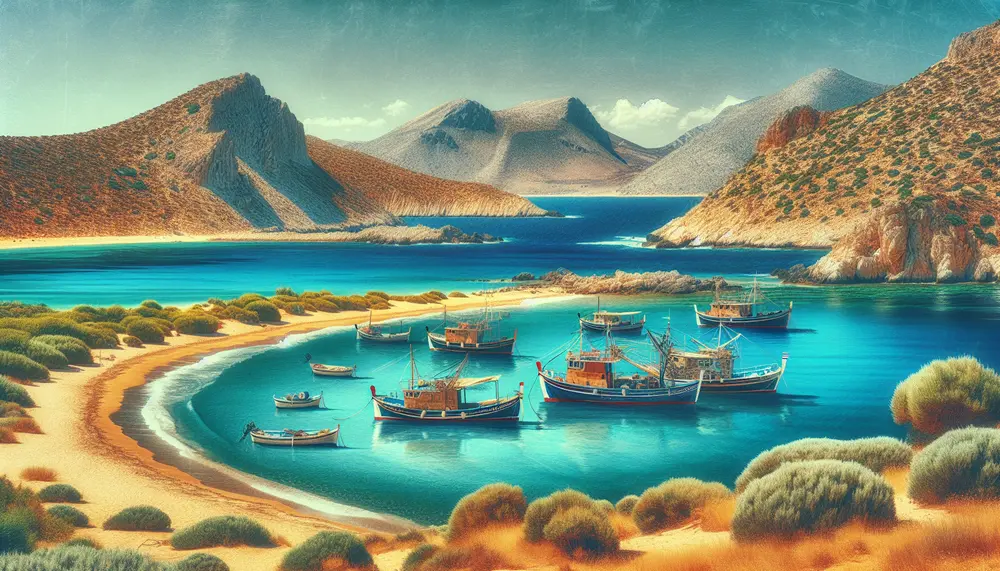Table of Contents:
Introduction to Greece's Maritime Past
Greece's maritime history is a tapestry woven with tales of exploration, trade, and naval prowess. The strategic location of Greece, nestled at the crossroads of Europe, Asia, and Africa, made it a hub for seafaring activities. From the earliest days, the Greeks harnessed the power of the sea to expand their horizons, establish trade routes, and spread their culture.
The Greek archipelago, with its numerous islands and peninsulas, provided natural harbors and safe havens for ancient mariners. This geographical advantage allowed the Greeks to become one of the most influential maritime civilizations in history. Their seafaring skills were not just about navigation; they encompassed shipbuilding, trade, and the spread of ideas across the Mediterranean and beyond.
Understanding Greece's maritime past offers insights into how the ancient Greeks interacted with their neighbors and how they left an indelible mark on the world. This rich history is a testament to their innovative spirit and their ability to adapt and thrive in a world dominated by the sea.
Ancient Greek Maritime Achievements
The ancient Greeks made significant strides in maritime achievements, setting the foundation for future generations of seafarers. Their innovations in shipbuilding were groundbreaking, with the development of the trireme, a powerful warship that became a symbol of Greek naval dominance. These vessels were designed for speed and agility, allowing the Greeks to excel in both trade and warfare.
Greek sailors were renowned for their navigation skills, utilizing the stars and other natural markers to traverse the vast Mediterranean Sea. This expertise enabled them to establish extensive trade networks, connecting distant lands and facilitating the exchange of goods, ideas, and culture. The Greeks traded olive oil, wine, and pottery, which were highly sought after across the ancient world.
Moreover, the Greeks' ability to adapt to different maritime environments allowed them to explore and colonize new territories. They founded numerous colonies along the coasts of the Mediterranean and the Black Sea, spreading their influence far and wide. These colonies not only served as trading posts but also as cultural outposts, promoting the spread of Greek language, art, and philosophy.
The Influences and Impacts of Greek Maritime History
| Aspect | Pro | Con |
|---|---|---|
| Geographical Advantage | Enabled development of extensive trade networks and cultural exchange; Provided natural harbors and safe havens. | Vulnerability to invasions due to exposure from the sea. |
| Shipbuilding Innovations | Development of powerful vessels like the trireme, enhancing military and trade capabilities. | High resource consumption and expenditure; Dependency on skilled labor. |
| Naval Warfare Advances | Dominance in pivotal battles such as the Battle of Salamis; Revolutionized naval combat tactics. | Continuous maritime conflict led to loss of life and economic strain. |
| Cultural Exchange | Spread of Greek art, language, and philosophy, influencing the Hellenistic period. | Possible cultural homogenization and loss of indigenous cultures. |
| Economic Implications | Enhanced prosperity through trade of valuable goods and resources. | Economic dependency on trade could lead to instability in times of conflict or blockade. |
The Role of the Aegean Sea
The Aegean Sea played a crucial role in shaping the maritime history of Greece. This body of water, dotted with islands and bordered by the Greek mainland and Asia Minor, served as a natural highway for ancient Greek sailors. Its relatively calm waters and numerous islands provided ideal conditions for early navigation and exploration.
The Aegean Sea facilitated the growth of trade and commerce among the Greek city-states and their neighbors. It acted as a conduit for the exchange of goods, such as grain, metals, and luxury items, which were essential for the prosperity of ancient Greek society. The sea also enabled cultural interactions, allowing ideas and innovations to flow freely between different regions.
Furthermore, the Aegean Sea was central to the development of Greek maritime power. Control over its waters meant dominance in trade and military affairs. The strategic importance of the Aegean Sea was evident in numerous historical conflicts, where control of its islands and coastlines often determined the outcome of wars. Thus, the Aegean Sea was not just a geographical feature but a vital component of Greece's maritime legacy.
Maritime Trade and Cultural Exchange
Maritime trade was the lifeblood of ancient Greece, fueling its economy and fostering cultural exchange across the Mediterranean. Greek merchants traveled far and wide, establishing trade routes that connected them with Egypt, Persia, and even the distant lands of the Iberian Peninsula. These routes were not just pathways for goods but also for ideas and cultural influences.
The exchange of goods was diverse, with the Greeks exporting products like olive oil, wine, and ceramics, while importing grain, metals, and luxury items. This trade network helped sustain Greek city-states, providing them with resources that were scarce in their own territories. The wealth generated from trade contributed to the flourishing of Greek art, architecture, and philosophy.
Cultural exchange was an integral part of maritime trade. As Greek merchants interacted with other cultures, they absorbed and adapted foreign ideas, which enriched their own society. This cross-cultural interaction led to the spread of Greek language and customs, laying the groundwork for the Hellenistic period, where Greek culture permeated much of the known world. Thus, maritime trade was not just an economic activity but a catalyst for cultural transformation.
The Influence of Greek Mythology
Greek mythology had a profound influence on the maritime practices and beliefs of ancient Greece. The sea was a central theme in many myths, with gods and heroes often embarking on epic voyages. These stories not only entertained but also provided moral and practical lessons for sailors and traders.
The god Poseidon, ruler of the sea, was a pivotal figure in Greek mythology. Sailors often prayed to him for safe passage and favorable winds. His temperamental nature reflected the unpredictable and sometimes perilous nature of the sea. This reverence for Poseidon underscored the Greeks' respect for the ocean's power and their reliance on divine favor for successful voyages.
Mythological tales like the journey of Odysseus in "The Odyssey" highlighted the challenges and adventures of seafaring life. These stories emphasized themes of bravery, cunning, and perseverance, qualities essential for navigating the vast and often treacherous waters. The influence of these myths extended beyond storytelling, shaping the cultural identity of Greece and reinforcing the significance of the sea in their daily lives.
Naval Warfare and Technological Advances
Naval warfare was a critical aspect of ancient Greek society, driving technological advances that shaped maritime history. The Greeks were pioneers in developing sophisticated warships, most notably the trireme. This vessel was a marvel of engineering, designed for speed and maneuverability, allowing Greek fleets to dominate the seas.
The trireme featured three rows of oars on each side, manned by skilled rowers who could propel the ship swiftly through the water. Its design included a bronze-clad ram at the prow, used to strike and disable enemy vessels. This innovation revolutionized naval combat, making the Greeks formidable opponents in battles such as the famous Battle of Salamis.
Beyond ship design, the Greeks also made strides in naval tactics and strategy. They developed formations like the diekplous and periplous, which maximized the effectiveness of their fleets in combat. These tactics required precise coordination and discipline, showcasing the Greeks' strategic acumen. The combination of technological and tactical advancements cemented their reputation as masters of the sea, influencing naval warfare for centuries to come.
The Decline and Legacy of Greek Seafaring
The decline of Greek seafaring began as larger empires emerged, overshadowing the once-dominant Greek city-states. The rise of Rome and the expansion of their naval power gradually diminished Greece's influence over the Mediterranean. Political instability and internal conflicts further weakened their maritime capabilities.
Despite this decline, the legacy of Greek seafaring endured. The innovations and techniques developed by the Greeks laid the groundwork for future maritime exploration and trade. Their ship designs and navigational skills were adopted and adapted by subsequent civilizations, influencing the course of naval history.
The cultural and intellectual exchanges facilitated by Greek maritime activities left a lasting impact on the world. Greek language, art, and philosophy spread across the Mediterranean, shaping the cultural landscape of the region. The myths and stories of Greek seafarers continued to inspire generations, underscoring the enduring legacy of Greece's rich maritime history.
Conclusion: The Lasting Impact of Greece's Maritime History
The maritime history of Greece is a testament to the enduring spirit of exploration and innovation. From their pioneering ship designs to their strategic naval tactics, the Greeks set standards that influenced maritime practices for centuries. Their ability to harness the sea for trade and cultural exchange played a pivotal role in shaping the ancient world.
The legacy of Greek seafaring extends beyond technological advancements. It fostered a rich cultural exchange that spread Greek art, language, and philosophy across the Mediterranean. This cultural diffusion laid the foundations for the Hellenistic period, during which Greek influence reached its zenith.
Today, the impact of Greece's maritime history is still evident. Modern seafaring and naval strategies owe much to the innovations of ancient Greece. The stories and myths of Greek sailors continue to captivate and inspire, reminding us of the indomitable human spirit that seeks to explore and understand the world. Greece's maritime legacy is a lasting tribute to their profound influence on history and culture.
FAQ on Greece's Maritime Legacy
What role did Greece's geography play in its maritime history?
Greece's geography, with its islands and peninsulas, provided natural harbors and safe havens for mariners, enabling the Greeks to develop extensive trade networks and engage in cultural exchange.
How did Greek shipbuilding influence their maritime success?
Greek shipbuilding innovations, such as the development of the trireme, a powerful and agile warship, significantly enhanced their military and trade capabilities, leading to naval dominance.
What were the key factors in the success of Greek maritime trade?
Greek maritime trade thrived due to their advanced navigation skills, strategic location connecting Europe, Asia, and Africa, and the exchange of valuable goods such as olive oil, wine, and pottery.
How did Greek mythology influence their maritime pursuits?
Greek mythology, with gods like Poseidon and stories such as "The Odyssey," played a significant role in shaping seafaring practices and beliefs, emphasizing bravery, cunning, and the power of the sea.
In what ways did Greece's maritime history leave a lasting legacy?
Greece's maritime history laid the foundation for future naval exploration, influenced global cultural exchanges, and left an indelible mark on art, language, and philosophy across the Mediterranean.



